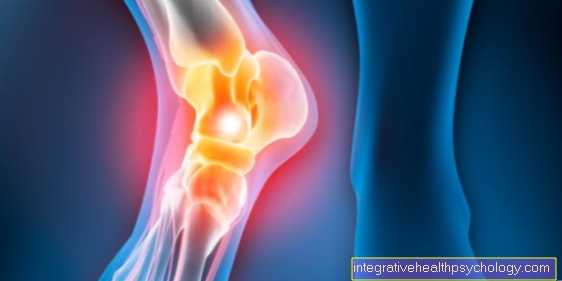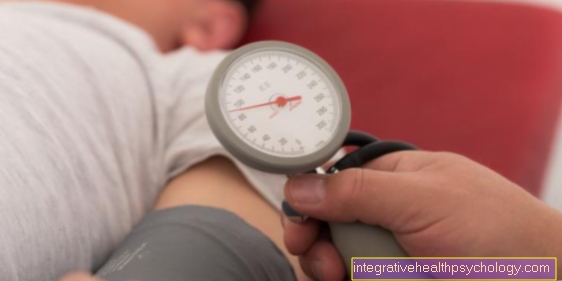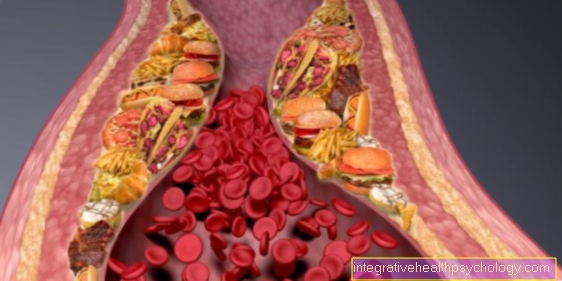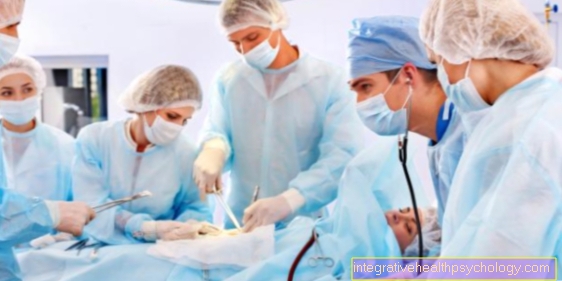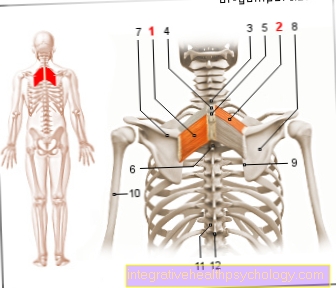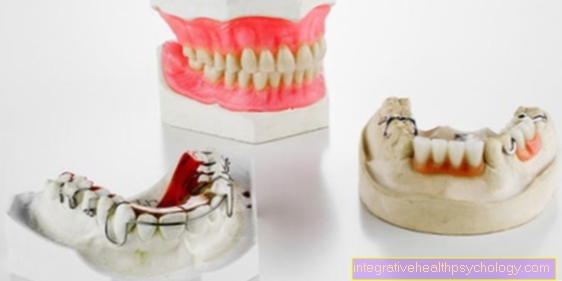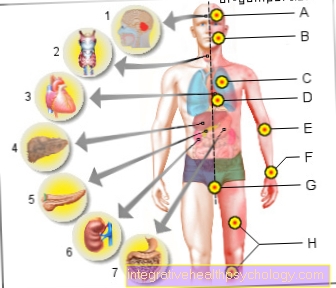Gastric bypass
What is gastric bypass?
With the gastric bypass, the food is guided past the stomach via a loop of the small intestine. The gastric bypass is created during a surgical procedure. As a result, the body can take in less food and there is rapid and severe weight loss. This method is very efficient for weight reduction in very overweight people (BMI> 40 kg / m²). But it has many side effects and has lifelong consequences. To be successful, it must be accompanied by lifestyle and diet adjustments.

Indications for gastric bypass
Gastric bypass can be indicated in case of severe obesity. Formally, there is severe overweight (obesity) with a BMI> 35 kg / m². Obesity causes other symptoms, especially with increasing age, such as Joint pain. In Germany, doctors with a BMI> 40kg / m² or a BMI> 35 kg / m² with concomitant disease / s due to obesity indicate gastric bypass surgery.
When these conditions are met, additional factors are checked. First of all, it is important to decide whether the person concerned can undergo this procedure at all or whether the risk is too high. If this is the case, surgery must be avoided. Furthermore, the possible weight loss must be assessed individually. Eating behavior also plays a role in the decision as to whether the operation makes sense. After all, the patient must be able to adapt his diet and lifestyle to the changed situation after the procedure. It is also very important that the patient is aware of the consequences of the operation and of his own responsibility in the follow-up treatment. The decision for or against gastric bypass ultimately rests with the patient himself.
More information can be found here: Stomach reduction such as What is the best way to lose weight?
Preparatory examinations
The preparatory examinations serve to assess the operability of the patient and to weigh possible complications. They are very important and serve the safety of the patient.
In order to be able to be anesthetized, a pulmonary function test is necessary and, in most cases, a heart examination. Usually this is a cardiac ultrasound and an EKG. Furthermore, blood is drawn to determine several laboratory parameters, such as hemoglobin.
A gastroscopy is done to examine the stomach. A 24-hour acid test is also carried out. This examines the reflux of acid from the stomach into the esophagus. If certain diseases or risk factors are present, further examinations may be necessary. The doctor will inform you about this in these cases. In addition, a detailed discussion with the doctor is of course important. The doctor must explain the complications and the consequences. A change in diet is often started before the operation.
Course of the operation
The operation is performed under general anesthesia. The procedure is usually performed laparoscopically to prevent large scars. This means that the surgical instruments and a camera are introduced through incisions that are only a few centimeters long. Furthermore, air is given into the abdominal cavity during the operation so that it inflates and the surgeon can work more easily.
With gastric bypass, the esophagus is first separated from the rest of the digestive tract shortly after it enters the stomach, so that a very small part of the stomach is retained. The rest of the stomach is sewn up tightly. The esophagus and the small part of the stomach are connected to the small intestine. For this purpose, the small intestine is divided about half a meter after it begins at the stomach outlet. The lower small intestine is pulled up and connected to the small stomach. This will restore normal food passage by bypassing the stomach. The rest of the stomach remains in the body and continues to produce stomach acid and hormones. The part of the small intestine, which is connected to the stomach but separated from the rest of the digestive tract, is sewn to the side of the small intestine further down. This is important so that the digestive juices from the pancreas and the bile can get to the pulp. These are released into the intestine shortly after the stomach outlet.
The intestinal loops then form a type of Y. This is why the operation is called Rough-Y gastric bypass. The surgeon must check the connection between the remaining stomach and the small intestine for leaks. In addition, make sure that there is no tension on the connections (in technical jargon it is called Anastomoses spoken), as this prevents the seam from healing. At the end the instruments are carried out again and the small skin stitches are closed.
More information can be found here:
- Roux-en-y gastric bypass
- Gastric bypass surgery - you should consider this!
How long does the operation take?
The duration of the procedure is around 3 to 4 hours. The procedure can be extended quickly in individual cases. After previous operations there are often adhesions in the abdomen. Loosening such adhesions can be very time consuming. Complications such as bleeding or damage to other abdominal structures also prolong the operation.
How long do I have to stay in the hospital?
After gastric bypass surgery, the patient has to stay in the hospital for about 5 days to rule out possible postoperative complications, such as inflammation in the abdominal cavity. In the event of postoperative complications, unforeseen events in the operating room or the existence of other diseases, the hospital stay can also be significantly extended.
What does the follow-up treatment look like after the operation?
Immediately after the operation, you start eating. Only liquid food can be consumed for the first two weeks. In the third week you switch to pureed food until you can start with light whole foods in the fourth week.
A very important point of aftercare is the change in diet. It is advisable to start with this before the procedure and to be accompanied by a nutritionist. The long-term success of the operation depends on this. In addition to the changed lifestyle, follow-up examinations are also important. This primarily includes regular laboratory controls. Particular care is taken to ensure that all nutrients and vitamins are adequately absorbed. The most important are vitamin B12 and calcium.
But ultrasound examinations of the abdominal organs are also carried out. The special focus here is on the gallbladder. In the first year after the operation, the follow-up examinations are initially carried out at short intervals, then every year. In your own interest you can also visit a self-help group.
What are the risks of the operation?
A more common problem is that the connections sewn between the small intestine and the stomach leak or become infected. One speaks then of an anastomotic leakage or a leak. In such a case, a further surgical procedure is mandatory.
Other less common complications include bleeding, injury to other structures in the abdominal cavity, inflammation of the abdominal cavity, bowel obstruction, and blood poisoning. In some cases, during the operation, it is necessary to switch from the minimally invasive method to the open technique with a large scar.
The fact that many people lie down after the procedure also increases the risk of developing thromboses (blood clots). As with any operation, complications can occur during anesthesia. On the one hand, this can be post-operative nausea. Serious complications, such as cardiovascular disorders and allergies, are very rare. However, complications during operations are more common in overweight people than in people of normal weight.
All important information can be found at:
- These are the risks of gastric bypass
- Causes of an intestinal obstruction
- Postoperative anemia
What complications can arise after years?
The most common complications after years are deficiencies due to insufficient intake of vitamins or minerals. However, if you regularly go to laboratory checks, these can usually be recognized and treated at an early stage. In addition, every person affected is recommended to supplement certain vitamins and minerals.
Among other things, it can lead to a vitamin B12 deficiency, which leads to anemia. A lack of protein is also possible. This can manifest itself in hair loss, susceptibility to infection and poor wound healing. In addition, after the operation it can be found that some foods are no longer tolerated.
Other possible complaints are hernias and gallstones. Stomach pain or even stomach bleeding due to the continued acid production can also occur after years. The rapid weight loss also creates unsightly flaps of skin. If complications arise, a doctor should always be consulted.
This article might also interest you: Vitamin B12 deficiency
Side effects of gastric bypass
Diarrhea after gastric bypass
Diarrhea can occur when food reaches the small intestine too quickly, also known as early dumping.
Food that is particularly high in sugar then draws fluid from the intestinal lining into the intestine and thus causes diarrhea. When diarrhea occurs, careful attention must be paid to diet. Sugary foods should be avoided.
If the diarrhea does not improve, a doctor should be seen. This can give recommendations on nutrition and, if necessary, determine causes independent of gastric bypass.
Please also read our article on the so-called dumping syndrome: What is dumping syndrome
Hair loss as a side effect after gastric bypass surgery
In general, hair loss is a sign of an undersupply of protein in the body. In the event of hair loss, the diet should be adjusted with foods that contain protein. A protein deficiency also shows up in an increased susceptibility to infection and worsened wound healing. You can get information from your doctor or a nutritionist here.
This article might also interest you: Hair loss therapy
Flatulence as a side effect after gastric bypass
Because the operation makes a large incision in the gastrointestinal tract, many patients experience digestive problems. These can improve over time. If you suffer from flatulence, flatulent foods like cabbage or carbonated acid should be avoided. A food diary can also be very helpful, in which it is noted what was eaten and what symptoms arose after eating. This makes it easy to determine which foods are well tolerated and which should be avoided. In severe cases, the flatulence should definitely be clarified by a doctor.
Post gastric bypass pain
In the days immediately after the operation, you will be given painkillers in the hospital. Usually these are sufficiently dosed.
Nevertheless, some patients complain of severe pain after the operation, others have hardly any pain and can stop taking painkillers very quickly. Also in the context of complications after the operation, e.g. Gallstones, severe pain can occur and may require further surgical interventions. In the long term, digestive-associated pain or non-specific abdominal pain can occur. Pain due to a disruption in wound healing is also possible.
What are the long-term effects of gastric bypass?
The long-term consequences of gastric bypass include life-long supplementation of food supplements. This should definitely be taken into account, as otherwise it is very easy to have an insufficient supply of vitamins, protein or minerals. In addition, the change in diet that accompanies gastric bypass surgery should not be underestimated. On the one hand, portions that are no longer so large are tolerated. These often lead to nausea or vomiting. On the other hand, there are often intolerances to various foods. Particularly often, intolerance symptoms are caused by very sugary or fatty foods. Lactose intolerance can also develop after the operation.
Furthermore, complications that have arisen from the procedure can persist for a very long time, such as Stomach pain. In addition, it should be noted that the shortened digestive tract may prevent medication from being adequately absorbed. In such cases, the drug dose must then be adjusted. Of course, regular follow-up examinations must also be performed. The positive long-term consequences of gastric bypass are the significant weight loss, which, however, also leads to skin flaps. Weight loss usually leads to an improvement in obesity-associated diseases. Diabetes mellitus usually improves significantly after gastric bypass. Often, insulin therapy is no longer necessary.
What do the health insurance companies cover?
In some cases, health insurers will pay the full cost of the operation. The exact conditions are different for the health insurance companies. As a rule, however, a BMI of over 40 kg / m² must always be available. If the BMI is between 35 and 40 kg / m², an obesity-related disease must be present.
In addition, conservative weight loss therapies, such as diet and exercise therapies, must have already been exhausted to no avail. This must be proven to the health insurance company. Of course, there must be no contraindication for the operation. An opinion from the doctor treated, the patient application with detailed information on obesity including secondary illnesses and a psychotherapeutic opinion must be submitted to the health insurance company. The psychotherapeutic opinion is intended to identify psychological factors that have a negative effect on the success of the therapy postoperatively. In addition, lifelong aftercare must be ensured. If all of these points are met, the health insurance companies will cover the costs. If the health insurance does not cover the costs, about 10,000 € must be raised for the operation.
This article might also interest you: Gastric bypass costs
What is dumping syndrome?
Dumping syndrome can occur after almost any gastric surgery.
Due to the very short passage through the stomach, the food reaches the small intestine too quickly. There is a sudden stretching of the small intestine. Foods that contain a lot of sugar are particularly problematic. These are hyperosmolar. This means that they pull a lot of fluid from the intestinal wall into the intestines. This effect can be so strong that there is a sudden lack of fluid in the vessels, which in turn can lead to a large drop in blood pressure with accompanying fainting.
Other symptoms include stomach pain, nausea, and diarrhea. This is what is known as early dumping. But there is also late dumping, which only occurs after two to three hours. The problem here is that sugar is absorbed too quickly and too much in the small intestine. This increases blood sugar, which can manifest itself in cold sweats, nausea and, in severe cases, shock symptoms.Normally the food is portioned through the stomach, which means that the sugar is absorbed evenly. With gastric bypass there is no longer any portioned delivery.
What happens to the vitamin intake after gastric bypass?
As mentioned earlier, some vitamins need to be supplemented. In principle, however, all vitamins are absorbed in the small intestine, but the absorption can no longer be sufficient due to the shortened small intestine.
Vitamin B12 is an important exception. It is also absorbed in the small intestine. However, a protein that is produced in the stomach is necessary for its absorption. For this reason, this vitamin can no longer be absorbed by the body in the small intestine and must therefore be injected.
What are the alternatives to gastric bypass?
Surgical alternatives to gastric bypass are the gastric sleeve, the gastric band and the gastric balloon.
Although the interventions are not as large as with gastric bypass, the measures do not achieve such strong effects. In any case, they should be discussed as an alternative, as they may be sufficient and also involve a lower risk. Of course, changing your lifestyle and diet is also an alternative to surgery. However, this requires a lot of discipline and only shows long-term success with a few.
Gastric band
The gastric band is tied around the stomach, creating a small stomach with a significantly smaller volume. Due to the reduced absorption capacity, a feeling of satiety arises early on when eating. The procedure is very low-risk and reversible.
However, there is a risk that the ligament will slip, the forestomach will stretch and the implant will become infected with bacteria. In the case of a forestomach stretch, an operation is often performed and a sleeve stomach is applied.
Read more about this: Gastric band
Gastric balloon
The gastric balloon is positioned over the esophagus in the stomach. There the balloon is inflated, reducing the stomach volume so that saturation occurs earlier.
No surgery is necessary for the procedure. However, the gastric balloon can remain in the stomach for a maximum of 6 months. Then the material will wear out. It becomes brittle and material can come off into the intestine. Escaped balloon material can lead to an intestinal ileus (intestinal obstruction). The gastric balloon is used particularly in patients for whom general anesthesia would be too dangerous.
More information can be found here: Gastric balloon
What is the difference to a sleeve stomach?
In contrast to gastric bypass, the gastric sleeve does not change the passage of food. Food continues to pass through the stomach and through the gastric exit into the duodenum.
Furthermore, there is no shortening of the small intestine passage in the sleeve stomach. In the case of a sleeve stomach, only the volume of the stomach is reduced by partially removing the stomach and sewing it narrower. This creates a kind of hose. The aim of the operation is to feel full before eating. In addition, the feeling of hunger is reduced, since the operation removes parts of the stomach that produce the so-called hunger hormone Grehlin.
Gastric sleeve surgery has similar risks and side effects as gastric bypass, but the side effects are not as severe or common. Malabsorption (insufficient food intake of certain nutrients) occurs less often with a sleeve stomach. Dumping syndrome usually never occurs in gastric sleeve. The long-term success rates are a little worse for the sleeve stomach. Persistent overeating leads to expansion and enlargement of the stomach volume. The gastric sleeve can later be operated on for gastric bypass surgery. In Germany, gastric bypass surgery is more common than gastric sleeve.
More information can be found here: Sleeve stomach
Can you reverse gastric bypass?
Theoretically it is possible to reverse gastric bypass. However, this is very risky and is usually not carried out.
Only if all other therapeutic measures for the existing symptoms do not work and there is no improvement over time, this intervention is considered. However, this operation is only performed by a few doctors due to the high risk. And reversing gastric bypass can also cause long-term problems. That is why such an intervention must be carefully considered and is the very last option.
How do I feed after gastric bypass?
First of all, due to the very small volume of the stomach, it is recommended to eat small portions.
When the diet has been rebuilt after the operation, a balanced mixed diet program is in place. However, there are a few things to keep in mind. So no alcohol should be drunk and no foods with a high sugar content should be consumed. It is also important to ensure that you have adequate vitamin intake and to eat plenty of vegetables and fruits. Protein-rich foods must also be considered in the diet, as there is a risk of protein deficiency.
Otherwise, it is generally recommended to ensure sufficient fluid intake and, if possible, not to drink while eating. Unfortunately, it can also turn out on an individual basis that some foods are no longer tolerated after the operation. However, this can improve over time.
More information can be found here: How do I feed after gastric bypass?
Gastric bypass and alcohol - are they compatible?
Due to the smaller stomach, alcohol is absorbed much faster and higher blood alcohol levels are reached earlier. It is therefore advisable to refrain from consuming alcohol in the event of gastric bypass disease or to only consume very small amounts. Excessive alcohol consumption can also quickly have bad effects on the liver.
Gastric bypass and pill - is the protection still in place?
In many cases, the hormones in the pill are no longer adequately absorbed and unplanned pregnancies can occur, which should, however, be avoided in the initial phase after the operation. It is therefore important not to rely on the pill as a contraceptive, but to look for alternative methods of contraception.
Can I still get pregnant after gastric bypass surgery?
It is possible to get pregnant after gastric bypass surgery. In fact, due to the reduction in body fat, fertility is increased.
Some doctors believe that it is better to get pregnant after gastric bypass surgery than before, as e.g. the risk of gestational diabetes is lower. However, you should wait with pregnancy until everything has healed after the operation and you can cope with the new situation. It is strongly recommended that you wait 12-18 months to become pregnant. Because it is during this period that the greatest weight loss occurs.
How big are the scars?
Since the operation is usually performed laparoscopically, i.e. minimally invasively using a laparoscopy, the scars are very small. Usually there are five to six scars about one to five centimeters long. In some cases the operation has to be done openly. This is then a single, very long scar that can also be eight inches long.

